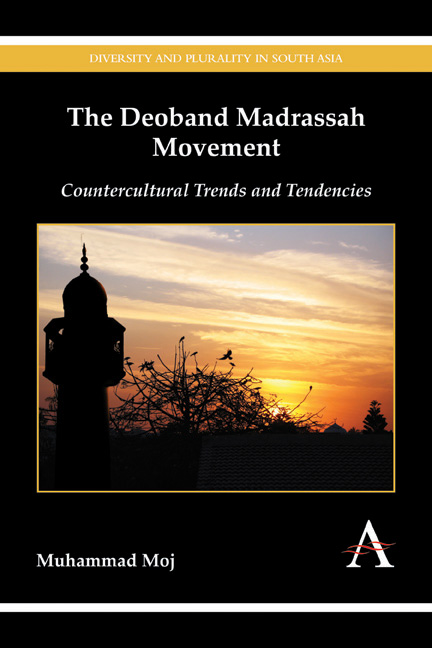Book contents
- Frontmatter
- Dedication
- Contents
- Preface
- Prologue
- Chapter 1 The Deoband Madrassah Movement: Research Context
- Chapter 2 Origin of the DMM: Seeds of a Counterculture
- Chapter 3 The DMM in United India: Activist Countercultural Trends
- Chapter 4 The DMM in Pakistan: Countercultural Politics and Extremism
- Chapter 5 Deobandi Islam: Countering Folk Islam and Popular Custom
- Chapter 6 The DMM versus Mainstream Society: Viewpoints of Deobandi Journals and Students
- Epilogue
- Appendix I The Deobandi Stance vis-à-vis Muslim Groups other than the Barelwis
- Appendix II Countercultural Exposition of the Deobandi Taliban
- Appendix III Interview Guide
- Glossary of Islamic Terms
- References
- Index
Chapter 1 - The Deoband Madrassah Movement: Research Context
Published online by Cambridge University Press: 05 December 2015
- Frontmatter
- Dedication
- Contents
- Preface
- Prologue
- Chapter 1 The Deoband Madrassah Movement: Research Context
- Chapter 2 Origin of the DMM: Seeds of a Counterculture
- Chapter 3 The DMM in United India: Activist Countercultural Trends
- Chapter 4 The DMM in Pakistan: Countercultural Politics and Extremism
- Chapter 5 Deobandi Islam: Countering Folk Islam and Popular Custom
- Chapter 6 The DMM versus Mainstream Society: Viewpoints of Deobandi Journals and Students
- Epilogue
- Appendix I The Deobandi Stance vis-à-vis Muslim Groups other than the Barelwis
- Appendix II Countercultural Exposition of the Deobandi Taliban
- Appendix III Interview Guide
- Glossary of Islamic Terms
- References
- Index
Summary
They see their values and conceptions of the good life disappearing, and they can find no way within the system to restore them.
Milton Yinger, Countercultures: The Promise and Peril of a World Turned Upside Down (1982, 210)This chapter spells out the research areas and schema of this book. The chapter unfolds at three levels. At the first level, it presents a brief history of madaris on the one hand and the DMM on the other. Secondly, it narrates the different interpretations of the DMM in the existing literature. At the third level, it explains the theoretical context as well as the research methodology.
Madaris in Islam
The Arabic word madrassah (plural: madaris) literally means ‘school’ (Riaz 2008, 2) or ‘place of learning’ (Malik 2008, 1). It originates from the word dars, which means ‘lesson’ or ‘instruction’. In the Arabic-speaking societies, the word madrassah can be applied to a wide variety of institutions (Berkey 2007, 40). However, in non-Arabic-speaking regions, this word is generally used to refer to a special kind of institution devoted to the training of ulama (religious scholars, plural of alim) through instruction about the Quran, the Hadith (traditions of the Prophet), fiqh (jurisprudence) and Islamic law (Riaz 2008, 2).
The tradition of madrassah is as old as the history of Islam itself. Although the word madrassah was not used as such, a study circle or halaqah was established for learning in the mosque of the Prophet Muhammad (peace be upon him, PBUH) in the city of Madinah. The ones who participated in that halaqah used to sit on an elevated platform called a suffah and were called Ashab al-Suffah (Arshad 2005, 21). Even during the life time of Prophet Muhammad (PBUH), nine such halaqahs had been established inside Madinah (Khalid 2002, 89). These non-formal educational arrangements, based in the mosques or in the homes of the Prophet's companions, were the precursors of madaris and continued during the era of the first four caliphs and even later (Riaz 2008, 53–4).
- Type
- Chapter
- Information
- The Deoband Madrassah MovementCountercultural Trends and Tendencies, pp. 1 - 28Publisher: Anthem PressPrint publication year: 2015



